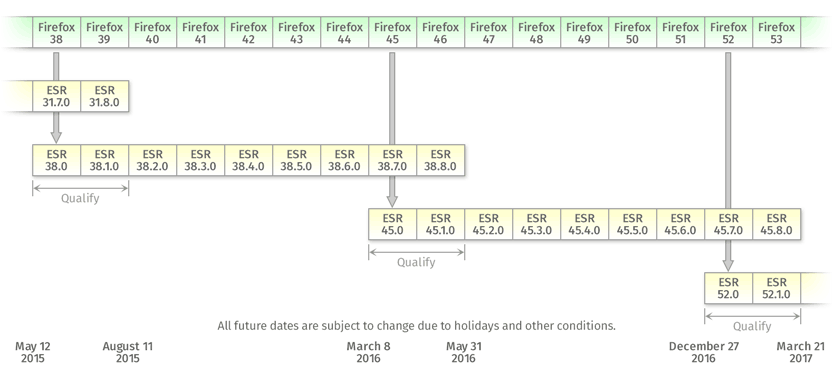
And at least in my case this wasn’t even the worst example of how much data could be going into recovery.js. Running at 1.1GB for every 45 minutes, you’re looking at ~35GB/day written to your SSD if you leave your machine running. Cookie* files had a ton of data written to them, as before.ĭepending on what you’ve got open in your tabs, Firefox could be dumping tons of data into recovery.js, cookie* files, or both. This time recovery.js was at ~1.5MB and it took only about 1/4-th of the time to get there.

FIREFOX ESR 24 PORTABLE WINDOWS
Again, I left all Firefox windows sitting idle, but only for ~10 minutes. Cleared all events in Process Monitor and re-started the capture. I went back to one of the Firefox windows and opened my mailbox. Note that recovery.js managed to accumulate only about 1.3MB of writes.
FIREFOX ESR 24 PORTABLE PRO
Simply searched for “samsung 850 pro review” and “samsung galaxy s7 review” and then went down the list of results opening them in new tabs. Next, I opened a bunch of random reviews for Samsung 850 pro and Samsung Galaxy S7 in two separate windows.I started the browser again and on this final restart the recovery.js file was only 5KB in size, down from around 900KB before.


Researching revealed that this is Firefox’s session backup file that is used to restore your browser sessions in case of a browser or an OS crash. That is extremely useful functionality. I was aware of the fact that Firefox had this feature, but I had no idea that session information was so heavy! To find out what’s going on, I fired up Resource Monitor and looked at disk utilization.Īt the very top of the list was Firefox, writing tirelessly at anywhere between 300K and 2MB per second to a file called “recovery.js”. firefox-with-32gb-written-in-a-single-day Even if the workstation was left idle with nothing running on it but a few browser windows, it would invariably write at least 10GB per day to the SSD. I monitored these stats over the next couple of weeks and this behavior stayed consistent. Since I didn’t recall downloading any huge files over the previous day or visiting any new sites that could’ve resulted in bringing down a lot of new content to the cache, this puzzled me. In my case, SSDLife notified me that 12GB was written to the SSD in one day. For those of you unfamiliar with this tool, it simply reports estimated lifetime for the attached SSD and it also shows the amount of data read and written.
FIREFOX ESR 24 PORTABLE FREE
Purely by chance, I fired up a free copy of SSDLife on two consecutive days where I haven’t really used my workstation for anything other than email and browsing. Observing the Issue: Heavy SSD Writes from Firefox This issue is being discussed in a STH forum thread where you can follow the discussion. This can have an unintended effect for those SSDs as session store data can write data constantly to NAND.

Today’s modern multi-core processor systems and higher quantities of RAM allow users to open multiple Firefox tabs and windows simultaneously. If you are a user of Firefox we have a must-change setting.


 0 kommentar(er)
0 kommentar(er)
